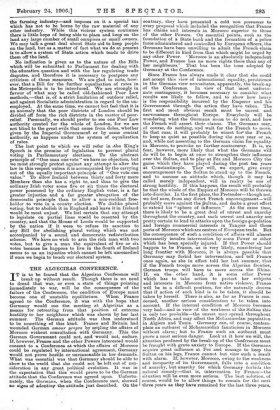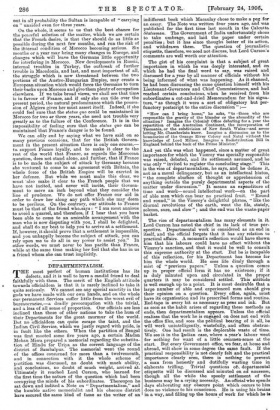THE ALGECIRAS CONFERENCE.
IT is to be feared that the Algeciras Conference will break up without result. Though there is no need to dread that war, or even a state of things pointing immediately to war, will be the consequence of the failure of the Conference, the condition of Europe must become one of unstable equilibrium. When France agreed to the Conference, it was with the hope that 'Germany would use the meeting at Algeciras as a means for retreating from that position of extreme hostility to her neighbour which was shown by her last summer. The German attitude was then understood to be something of this kind. France and Britain had wounded German =tour propre by settling the affairs of Morocco without consultation with Germany. This the German Government could not, and would not, endure. If, however, France and the other Powers interested would consent to a Conference at which the affairs of Morocco could be regulated, by international agreement, Germany would not prove hostile or unreasonable in her demands. What was essential was that Germany should be able to show to the world that she could not be left out of con- sideration in any great political evolution. It was in the expectation that this would prove to be the German attitude that the Conference was agreed upon. Unfortu- nately, the Germans, when the Conference met, showed no signs of adopting the attitude just described. On the contrary, they have presented a cold non possumus to every proposal which included the recognition that France has claims and interests in Morocco superior to those of the other Powers. On essential points, such as the foundation of a State bank and the formation of a police force administered and. controlled by European officers, the Germans have been unwilling to admit the French claim to be different in kind from,that which might be urged by any other Power. Morocco is an absolutely independent Power, and. France has no more rights there than any of her neighbours.' That has been the tone adopted. by Germany at the Conference.
Since France has always made it clear that she could not accept this view of international equality, persistence in the German view necessitates, apparently, the break-up of the Conference. In view of that most unfortu- nate contingency, it becomes necessary to consider what results are likely to follow, and to show how heavy is the responsibility incurred by the Emperor and his Government through the action they have taken. The first and most obvious result must be unrest and nervousness throughout Europe. Everybody will be wondering what the Germans mean to do next, and how the French will assert their claims. The Germans may, of course, do nothing, and wait for the French to move. In that case, it will probably be wisest for* the French to keep as quiet as possible during the next year or so, and, while not assenting to the German claim for equality in Morocco, to provoke no further controversy. It is, we fear, however, more likely that what the Germano will do will be to begin at once to strengthen their influence over the Sultan, and. to play at Fez and Morocco City the game -which they have played during the past ten years at Constantinople. They will, we expect, give every encouragement to the Sultan to stand up to the French, and to assume an attitude which, though it may be called merely independent, will in reality be one of strong hostility. If this happens, the result will probably be that the whole of the Empire of Morocco will be thrown into disorder. In the first place, the Pretender—though Snot, we feel sure, from any direct French encouragement—will probably move against the pultan, and make a great effort to extend his "sphere of influence." At the same time, there is likely to be a great deal of unrest and anarchy throughout the country, and such unrest and anarchy are pretty certain to lead to attacks upon the foreign .population and foreign commercial interests in Tangier and those ports of Morocco which are centres of European trade. But the consequence of such a condition of affairs will almost necessarily involve intervention by some Power or other which has been specially injured. If that Power should happen to be France, as is very likely, considering her long frontier with Morocco, it is always possible that Germany may forbid her intervention, and tell France once again, as she in effect told her last summer, that if the French troops move across the Algerian frontier, German troops will have to move across the Rhine. If, on the other hand, it is some other Power which has to take action to protect her subjects and interests in Morocco from native violence, France will be in a difficult position, for she naturally desires that if action of such kind is to be taken, it should be taken by herself. There is also, as far as France is con- cerned, another serious consideration to be taken into account. If the internal condition of Morocco becomes very bad—and in view of the weakness of the Sultan this is only too probable—the unrest may spread throughout North Africa, and may affect the Mohammedan population in Algiers and Tunis. Germany can, of course, contem- plate an outburst of Mohammedan fanaticism in Morocco without alarm ; but to France such an outburst must prove a most serious danger. Look at it how we will, the situation produced by the break-up of the Conference must be fraught with grave anxiety to Europe. If the Germans acquire great influence at Fez and manage to keep the Sultan on his legs, France cannot but view such a result with alarm. If, however, Morocco, owing to the weakness and incapacity of its Government, falls into a condition of anarchy, but anarchy for which Germany forbids the natural remedy—that is, intervention by France—the situation will be even more serious. The best solution, of course, would. be to allow things to remain for the next three years as they have remained for the last three years, nut in all probability the Sultan is incapable of "carrying on" unaided even for three years.
On the whole, it seems to us that the best chance for the peaceful solution of the matter, which we are certain that the French desire, is that they should do as little as possible during the next few months, and run the risk of the ihternal condition of Morocco becoming serious. Six months or a year may bring many changes in Europe, and changes which will leave the Germans little opportunity for interfering in Morocco. New developments in Russia, internal troubles in Turkey, the outbreak of further • trouble in Macedonia, and last, and most important of all, the struggle which is now threatened between the two portions of the Austro-Hungarian Empire, may create a European situation which would force the Germans to turn their backs upon Morocco and give them plenty of occupation elsewhere. If we take broad views, we shall see that time is in favour of France, and if only she can tide over the present period, the natural predominance which the posses- sion of Algiers gives her must assert itself. Indeed, if she could feel sure that the status quo could be maintained in Morocco for two or three years, she need not trouble very greatly as to the failure of the Conference. It is in the impossibility of feeling sure that the status quo can be maintained that France's danger is to be found.
We can only end by saying what we have said on so many previous occasions, that for the British Govern- ment in the present situation there is only one course,— to support France loyally, and to make it clear to the rest of the world that France, as regards the Moroccan question, does not stand alone, and further, that if France is to be made the subject of attack by Germany because she ventured to come to an agreement with Britain, the whole force of the British Empire will be exerted in her defence. But while we must make this clear, we must -also make it clear to the French people that we have not incited, and never will incite, their Govern- ment to move an inch beyond what they consider the line of prudence. We do not offer France our aid in order to draw her along any path -which she may deem to be perilous. On the contrary, our attitude to France must be that of the friend who.says "I am most anxious to avoid a quarrel, and therefore, if I hear that you have been able to come to an amicable arrangement with the man who is now disputing with you, I shall be delighted, and shall do my best to help you to arrive at a settlement. If, however, it should prove that a settlement is impossible, and you unhappily become the subject of attack, you can rely upon me to do all in my power to assist you." In other words, we must never be less pacific than France, while at the same time making her feel that she has in us a friend whom she can trust implicitly.











































 Previous page
Previous page